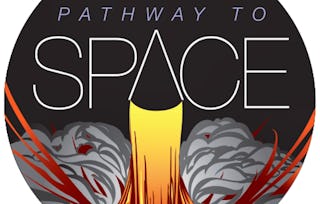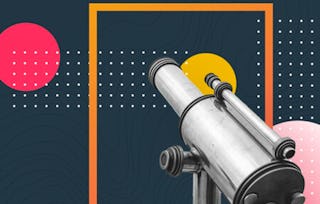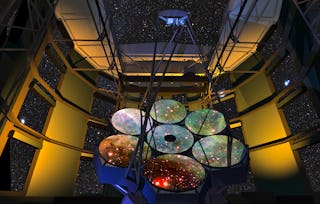Using publicly available data from NASA of actual satellite observations of astronomical x-ray sources, we explore some of the mysteries of the cosmos, including neutron stars, black holes, quasars and supernovae. We will analyze energy spectra and time series data to understand how these incredible objects work. We utilize an imaging tool called DS9 to explore the amazing diversity of astronomical observations that have made x-ray astronomy one of the most active and exciting fields of scientific investigation in the past 50 years.

Analyzing the Universe

234 reviews
Skills you'll gain
Details to know

Add to your LinkedIn profile
6 assignments
See how employees at top companies are mastering in-demand skills

There are 6 modules in this course
Welcome to Week 1 of "Analyzing the Universe!" This week we explore the nature of light, and how we get astronomical information from the images we obtain. The lectures and "wiki" material address these themes: light, image formation, and DS9. Dive right in!
What's included
7 videos4 readings1 assignment
Welcome to week two of "Analyzing the Universe". This week we will be exploring some of the means we have at our disposal to find out many things about the stars. It is really quite incredible that these tiny pinpoints of light can yield so much information about their nature and about the structure of the Universe as a whole. And if this is your first visit to the course, welcome and jump right in!
What's included
5 videos2 readings1 assignment
This week is our first in-depth look at an x-ray source, and it involves a white dwarf in a binary system. So sharpen up your detective skills, keep your copy of DS9 at the ready, and let's get down to business. It should be an exciting week.
What's included
4 videos2 readings1 assignment
This week we turn our attention to another fascinating cosmic source, discovered in the infancy of x-ray astronomy: Cen X-3. In so doing, we will see how binary stars can determine and influence many of the interesting and surprising features of our observations.
What's included
7 videos2 readings1 assignment
This week, we will be examining supernovae, and their remnants. These fascinating objects are the breeding grounds for future stars, and were the sources of virtually all the atoms that make up our solar neighborhood. Every atom of calcium in every bone in your body, for example, was once shot out of a supernova, billions of years ago.
What's included
2 videos2 readings1 assignment
This week we wrap things up with trips to galaxies and exotic objects, seen long ago and far away. The mysterious quasars provide clues about the way our Universe is evolving in time. They are incredible objects (actually, come to think of it, what isn't incredible in the x-ray sky?) discovered almost exactly a half century ago, quite by accident. We will explore the astonishingly prodigious x-ray output of 3C 273, one of the nearest ones, at a mere 2.5 billion light years away.
What's included
5 videos3 readings1 assignment
Instructor

Explore more from Physics and Astronomy
 Status: Preview
Status: PreviewCaltech
 Status: Free Trial
Status: Free TrialUniversity of Colorado Boulder
 Status: Preview
Status: PreviewUniversity of Arizona
 Status: Preview
Status: PreviewUniversity of Arizona
Why people choose Coursera for their career

Felipe M.

Jennifer J.

Larry W.

Chaitanya A.
Learner reviews
- 5 stars
84.68%
- 4 stars
12.34%
- 3 stars
0.42%
- 2 stars
0.85%
- 1 star
1.70%
Showing 3 of 234
Reviewed on Nov 3, 2019
Challenging, fascinating, stimulating - hard work but well worth it. Prof Matilsky is inspiring
Reviewed on May 22, 2020
Really an amazing and super insightful course.Literally the best course on coursera with an amazing professor explaining every minute details and teaches at very basic yet complex methods
Reviewed on Jul 11, 2017
Excellent professor ,made a dummy like me understand...Also I had no problem understanding him, even though English is not my native language... Very interesting subject, well explained. Recommended

Open new doors with Coursera Plus
Unlimited access to 10,000+ world-class courses, hands-on projects, and job-ready certificate programs - all included in your subscription
Advance your career with an online degree
Earn a degree from world-class universities - 100% online
Join over 3,400 global companies that choose Coursera for Business
Upskill your employees to excel in the digital economy
Frequently asked questions
To access the course materials, assignments and to earn a Certificate, you will need to purchase the Certificate experience when you enroll in a course. You can try a Free Trial instead, or apply for Financial Aid. The course may offer 'Full Course, No Certificate' instead. This option lets you see all course materials, submit required assessments, and get a final grade. This also means that you will not be able to purchase a Certificate experience.
When you purchase a Certificate you get access to all course materials, including graded assignments. Upon completing the course, your electronic Certificate will be added to your Accomplishments page - from there, you can print your Certificate or add it to your LinkedIn profile.
Yes. In select learning programs, you can apply for financial aid or a scholarship if you can’t afford the enrollment fee. If fin aid or scholarship is available for your learning program selection, you’ll find a link to apply on the description page.
More questions
Financial aid available,

